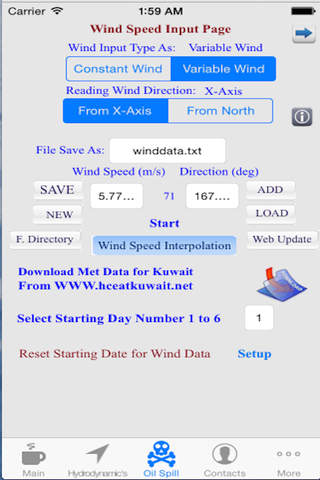
KOil kuw app for iPhone and iPad
Developer: Khaled Alsalem
First release : 15 Sep 2011
App size: 48.6 Mb
The use of numerical modeling in oil spill incidents is a well established technique that has proven to provide cost-effective and reasonable estimates
of oil surface drift. Good predictability of such models depends highly on the quality of the input data of the incident and on the model calibration effort. This App presents the results of simulating oil spillage trajectory in the Kuwait Water and Arabian Gulf. This App employed 2-D hydrodynamic KGulf model combined with oil spill model (KOil Model). The performance of the hydrodynamic model was tested against measurements of tidal fluctuation and sea currents at selected locations for more information on validation of the KGulf Model go to http://www.hceatkuwait.net/web_pas/web-KGulf/KGulf_report.pdf.
The Oil Spill analysis (KOil Apps) was setup using the flow field produced from the hydrodynamic simulation and its performance was further validated against documented events of Al-Shuabaa Kuwait Aug 2 2010 oil spill. The comparison of the actual and simulated oil spill drift was found reasonably acceptable allowing for further application in risk assessment in the entire Kuwait Water and Arabian Gulf as well. The approach was used, is an equivalent Monte Carlo (Random Walk) algorithm. According to Monte Carlo method the pollutant is divided into a large number of particles and at each time step, each particles is given convection and diffusive displacements. The convection displacement is computed by interpolation the water velocity to the position of the particles and multiplying by the time step. The diffusive displacement is computed using a random walk technique. In addition to convection and diffusion, the fate of the oil is affected by various physical changes due to weathering and evaporation."
For more Information on the KOil model go to website at http://www.hceatkuwait.net/request/KOil_report.pdf"
video presentation on the KOil apps go to website at http://www.hceatkuwait.net/request/Data_iphone.htm"



